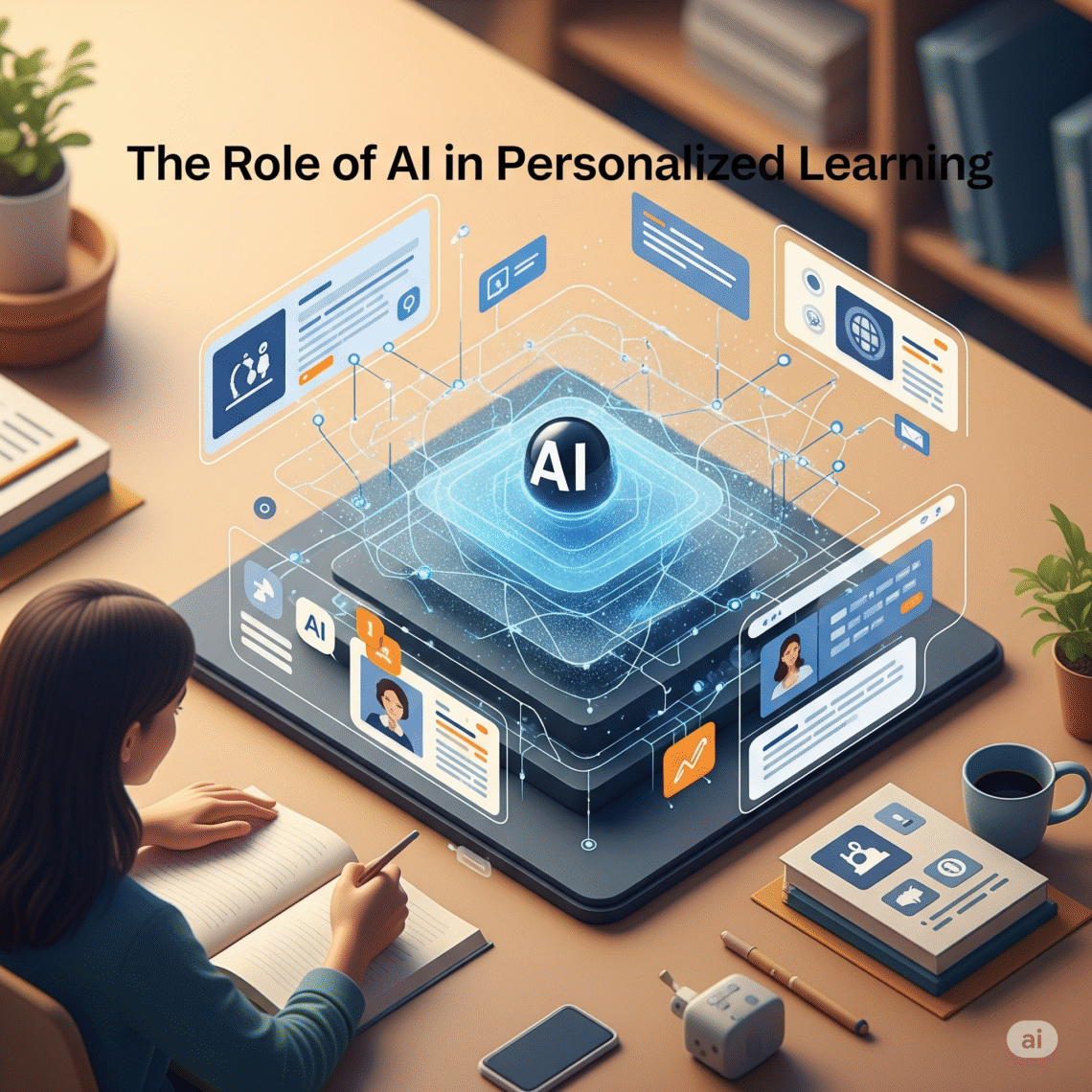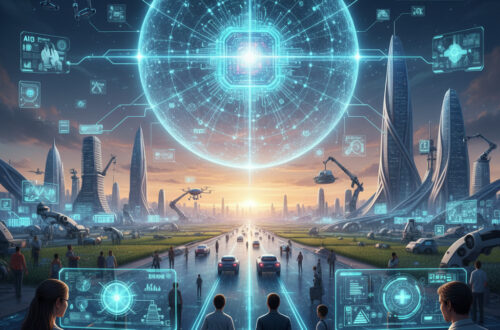The traditional “one-size-fits-all” approach to education, where every student progresses through the same curriculum at the same pace, is increasingly being challenged by the diverse needs and learning styles of modern learners. In response, personalized learning has emerged as a pedagogical imperative, focusing on tailoring education to each student’s unique strengths, needs, skills, and interests. At the heart of this transformative shift lies Artificial Intelligence (AI), which is rapidly redefining the educational landscape and fueling innovation within the EdTech sector. Especially in the wake of the COVID-19 pandemic, which accelerated the global shift towards hybrid and online learning, the role of AI in creating student-centric and adaptive educational experiences has become more prominent than ever.
What is Personalized Learning?
Personalized learning is an educational approach that customizes the learning experience to suit individual students. Instead of a uniform curriculum, it adapts content, pace, and instructional methods based on a student’s prior knowledge, learning style, mastery of concepts, and personal interests.
In contrast to traditional teaching, where a teacher delivers content to a whole class at a standardized pace, personalized learning leverages technology to create a dynamic and responsive environment. The need for data-driven learning models in modern classrooms is paramount, as understanding individual student progress and challenges is crucial for effective customization. AI provides the computational power to analyze this data and deliver truly individualized educational pathways.
How AI Enables Personalized Learning
AI’s ability to process vast amounts of data and learn from patterns is fundamental to its role in personalized learning:
- Use of Machine Learning Algorithms: AI employs machine learning (ML) algorithms to continuously analyze student performance data, including responses to quizzes, time spent on tasks, common errors, and areas of mastery. This ongoing analysis helps identify individual learning patterns and predict future performance.
- Real-time Adaptive Learning Systems: AI powers adaptive learning systems that adjust the difficulty, content, and pace of instruction in real-time based on a student’s ongoing interactions. If a student is struggling with a concept, the system might provide additional explanations, practice problems, or alternative learning resources. Conversely, if a student demonstrates mastery, it can accelerate their progress or introduce more challenging material.
- AI Assessing Learning Styles and Knowledge Gaps: Advanced AI algorithms can infer a student’s preferred learning style (e.g., visual, auditory, kinesthetic) by observing their engagement with different types of content. More importantly, AI excels at pinpointing specific knowledge gaps or misconceptions, allowing for targeted remediation.
- Integration with Learning Management Systems (LMS): AI seamlessly integrates with popular Learning Management Systems (LMS) like Moodle, Canvas, and Blackboard. This integration allows AI tools to access student data from various courses, track progress, and provide personalized recommendations or support directly within the familiar learning environment.
Core Applications of AI in Personalized Education
AI is being applied across various facets of education to facilitate personalized learning experiences:
a) Intelligent Tutoring Systems (ITS): ITS are AI-powered systems designed to provide one-on-one human tutoring experiences. They offer immediate, personalized feedback, explanations, and hints as students work through problems.
- Examples: Carnegie Learning’s Mathia uses AI to provide adaptive instruction and coaching. Squirrel AI Learning, a prominent player in China, employs ITS to offer personalized learning paths based on diagnostic assessments.
b) Adaptive Learning Platforms: These platforms are the most direct application of AI in personalized learning, dynamically adapting content and assessments.
- Examples: Knewton Alta personalizes learning experiences across various subjects. DreamBox Learning uses AI to adapt math lessons for K-8 students. Century Tech leverages AI to create personalized learning pathways for K-12 students, identifying strengths and weaknesses.
c) AI-Powered Assessments: AI is revolutionizing how student understanding is evaluated.
- Auto-generating and grading quizzes: AI can create customized quizzes based on a student’s current learning progress and automatically grade them, providing instant feedback.
- Detects cheating and plagiarism: Advanced AI algorithms can analyze text and behavioral patterns to detect instances of academic dishonesty, enhancing assessment integrity.
- Predicts performance trends: By analyzing historical data, AI can predict future academic performance, allowing educators to intervene early with struggling students.
d) Natural Language Processing (NLP) for Feedback: NLP allows AI to understand and respond to human language, enabling more natural interactions.
- AI chatbots can answer student questions about course material in real-time, providing instant support and clarifying concepts.
- Voice assistants (e.g., specific Alexa skills for learning) can deliver educational content, engage in interactive lessons, or answer questions verbally.
e) Learning Analytics & Progress Tracking: AI provides educators and students with powerful insights into learning progress.
- Visual dashboards present detailed data on student performance, engagement, and mastery of learning objectives, allowing teachers to identify trends and intervene proactively.
- AI generates personalized learning paths and recommendations, suggesting relevant resources, exercises, or topics for further study based on individual needs.
Benefits of AI in Personalized Learning
The adoption of AI in personalized learning offers a multitude of advantages:
- Improved learning outcomes and retention: By tailoring content to individual needs, AI helps students grasp concepts more effectively, leading to deeper understanding and better long-term retention of knowledge.
- Faster feedback and more efficient instruction: AI can provide immediate feedback on assignments and exercises, which is crucial for effective learning. It also frees up teachers from routine grading tasks, allowing them to focus on more complex instructional challenges.
- Encourages self-paced, independent learning: AI empowers students to learn at their own speed, revisiting difficult concepts or accelerating through mastered material, fostering greater autonomy in their education.
- Real-time performance analysis and improvement: Continuous data collection and AI analysis allow for real-time insights into student progress, enabling immediate adjustments to teaching strategies and learning resources.
- Scalability across regions and languages: AI-powered personalized learning platforms can be scaled to reach millions of students globally, overcoming geographical barriers and supporting learning in multiple languages, thus democratizing access to quality education.
Real-World Use Cases and Examples
AI-powered personalized learning is being successfully implemented across the globe:
- China: Squirrel AI: This leading Chinese EdTech company utilizes adaptive learning technology on a national scale, providing personalized learning plans for K-12 students across a wide range of subjects. Their system diagnoses knowledge gaps and customizes content delivery based on student performance.
- USA: Duolingo: The popular language-learning app uses AI extensively to personalize the learning experience. Its algorithms analyze user performance to determine optimal lesson difficulty, timing of reviews, and identify areas where a learner needs more practice, making language acquisition highly efficient.
- India: BYJU’s: One of the world’s largest edtech companies, BYJU’s employs AI for customization, catering to students across various educational boards and learning levels. Their AI personalizes content, quizzes, and learning paths based on student interactions and performance data.
- UNESCO & Microsoft partnerships: International organizations like UNESCO are collaborating with tech giants like Microsoft to explore and implement ethical AI solutions in global education, focusing on equitable access and personalized learning to address learning disparities worldwide.
Challenges and Ethical Concerns
Despite its promise, the widespread adoption of AI in personalized learning faces significant challenges and ethical considerations:
- Algorithmic bias in recommendations: If AI models are trained on unrepresentative or biased data, their personalized recommendations could inadvertently reinforce stereotypes or limit a student’s exposure to diverse perspectives and subjects.
- Data privacy and student consent: The extensive collection of student data by AI systems raises significant concerns about privacy. Compliance with regulations like FERPA (Family Educational Rights and Privacy Act) in the US and GDPR (General Data Protection Regulation) in Europe is paramount, ensuring secure data handling and obtaining proper consent.
- Teacher de-skilling concerns: Some educators worry that an over-reliance on AI might de-skill teachers, reducing their critical role in instructional design and student interaction. It’s crucial to position AI as a tool that augments, rather than replaces, human educators.
- Digital divide and unequal access to AI tools: The benefits of AI in personalized learning may exacerbate existing inequalities if students in underserved areas lack access to necessary technology, reliable internet, or even electricity. This risks widening the digital divide.
- Over-reliance on technology over human connection: While AI provides efficiency, the human element of teaching—empathy, mentorship, and social interaction—remains irreplaceable. An excessive focus on AI could diminish the crucial human connection in education.
The Future of AI in Personalized Education
The future of AI in personalized education promises even deeper integration and more immersive experiences:
- Integration with AR/VR for Immersive Learning: AI will combine with Augmented Reality (AR) and Virtual Reality (VR) to create highly immersive and interactive learning environments, allowing students to explore complex concepts through virtual simulations and hands-on experiences.
- AI Emotional Recognition to Gauge Student Motivation: AI could develop the capability to interpret student emotions and engagement levels (e.g., through facial expressions, voice analysis), allowing adaptive systems to adjust content or intervention strategies to maintain motivation and address frustration.
- Federated Learning to Improve Privacy: This privacy-preserving machine learning technique will enable AI models to be trained on decentralized student data without centralizing sensitive information, significantly enhancing data security and compliance.
- Global Policy Frameworks for Equitable AI Education: International bodies will increasingly work towards establishing common ethical guidelines and policy frameworks to ensure that AI in education is deployed equitably and responsibly across the globe.
Best Practices for Implementing AI in Education
For successful and ethical integration of AI into personalized learning, consider these best practices:
- Collect high-quality and diverse datasets: Ensure that the data used to train AI models is representative of all student demographics to minimize bias and promote fairness in recommendations.
- Ensure explainable AI for transparency: Strive for AI models whose decision-making processes are understandable to educators and students, fostering trust and enabling critical assessment of AI recommendations.
- Encourage hybrid teacher-AI collaborations: View AI as a powerful assistant to teachers, empowering them with data and tools to personalize instruction, rather than seeing AI as a replacement.
- Train educators in AI literacy and tools: Provide professional development for teachers to understand AI’s capabilities, limitations, and how to effectively integrate AI tools into their pedagogical practices.
Conclusion
AI is not destined to replace teachers, but rather to profoundly enhance their impact and enable a truly student-centric approach to education. By leveraging AI’s capacity for data analysis and adaptation, we can move towards a future where learning is inherently personalized, accessible, and highly effective for every individual. While ethical considerations and challenges related to data privacy and digital equity must be diligently addressed, the transformative potential of AI in personalized learning in bridging educational gaps and fostering inclusive, accessible, and lifelong learning for all is undeniable. Embracing these tools, while maintaining the irreplaceable human touch of educators, will define the next era of educational innovation.





